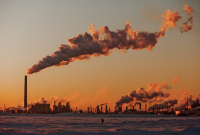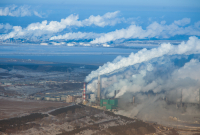Support strong Canadian climate journalism for 2025
Oil analysts say a rebound in the world's hunger for oil has already started after demand destruction caused by the COVID-19 pandemic fell far short of what many experts had expected.
Amrita Sen, co-founder and director of research for international consultancy Energy Aspects, says the bounce in demand will outstrip the ability of producers to restore supply, resulting in average Brent oil prices rising from about US$43 per barrel this year to US$66 next year and US$83 in 2023.
In a presentation at the virtual TD Securities energy conference, Sen says pandemic lockdowns of countries and industries resulted in forecasts for a 30 to 40 per cent decline from pre-pandemic global oil demand of about 100 million barrels per day.
She says her organization expected the decline to reach 28 million bpd but the maximum drop was 18 million bpd in April. The industry's "spare capacity" has now has fallen to about 12 million bpd.
Sen says the shallower drop in demand and quick recovery illustrates how dependent the world is on crude and suggests that its oil dependence will not be diminished in the near term.
In an energy price forecast released Monday, accounting firm Deloitte also makes note of the oil demand recovery and predicts Brent crude prices will rise from an average of US$39 per barrel this year to US$46.50 in 2021 and US$64 in 2023.
"The market thought that demand would fall by between 30 and 40 million barrels a day," said Sen, noting that spot oil prices fell to negative levels at one point because investors believed demand would reach extremely low levels.
"COVID apparently was going to speed up peak oil demand (but) I would go the other way and argue that, if anything, COVID's shown us how much oil is required. Even in the worst case possible for demand, we fell by less than 20 per cent."
This report by The Canadian Press was first published July 6, 2020.





Comments
The Pandemic - like any crisis, allowed human beings a choice: one, to make the changes necessary such that when confronted with similar (or attendant) problems in the future, we would have changed our ways; or two, to double down upon our pre-crisis behaviors and just plow through.
More Public as opposed to Private Health Care, an Employment structure that ensured a default guaranteed annual income, a reassessment of the importance of great wealth and its influence, and not least - a transition to less suicidal sources of energy, would all have been intelligent, and more sustainable choices.
Disaster Capitalism however, seems to be winning the day - especially here in Alberta, and unfortunately reinforcing that line about human beings not so much solving their problems, as surviving them ... assuming, of course - as some optimistically do (even under the current behavioral trajectory), that it is even possible for our civilization to survive what we face in the future.